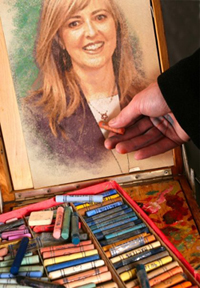Catching Up - Part I
 Wednesday, July 13, 2011 at 10:21PM
Wednesday, July 13, 2011 at 10:21PM 
In case you haven’t noticed, I took a break from my blog. I’ve had plenty to write about, though. This last month, I:
a) Finished my two-year CTE Teacher Preparation Program;
b) Finished my first year of teaching;
c) Cleaned out my classroom and office, turned in the keys, and said my good-byes to Lakewood High School (my contract was not renewed due to budget cuts);
d) Came home from my last day of work and found a voice mail from the school district offering me a contract next year for half the hours (.4 FTE);
e) Declined the reduced offer since it would be only 16 hours a week and involves a commute (and won’t cover my bills, especially increased college tuition for the kid);
f) Applied for unemployment (still waiting to hear if I’ll get the benefits);
g) Applied for nine jobs to meet the unemployment requirements (three employer contacts per week);
h) Celebrated our 30th wedding anniversary by getting married in the Orthodox Church!
I guess part of the reason I haven’t written during this time is that I’ve had such a plethora of emotions about each one of the aforementioned events. Writing about everything just seemed overwhelming. I am still decompressing and processing it all.
 Ending my first year of teaching. Wow. The words exhausting, rewarding, challenging, and relieved come to mind. I went to work most every day frightened and excited at the same time. I believe that God placed me at Lakewood High School for a purpose. Even if my students learned nothing else from me, I hope that I gave them an example of a decent adult human being to interact with every day.
Ending my first year of teaching. Wow. The words exhausting, rewarding, challenging, and relieved come to mind. I went to work most every day frightened and excited at the same time. I believe that God placed me at Lakewood High School for a purpose. Even if my students learned nothing else from me, I hope that I gave them an example of a decent adult human being to interact with every day.
As an aside, I recently encountered the following explanation of a vocation and realized that it truly resonated with me (in the simplest terms, “vocation” means a “call”). I could honestly answer every one of the questions in the affirmative when it comes to my teaching career:
How can I tell if I have a Vocation?
If you have a vocation, there are a few signs that may indicate you’re on the right path in discerning a vocation.
First is that you feel “at home” there. Since your vocation is what God created you for, so obviously when you’re where He wants you to be, you’ll have the feeling that you are where you are supposed to be. It’s a fit, in other words.
Second, you should probably feel a little overwhelmed at the idea. Excited and terrified at the same time? Yes, it is kind of like that.
Third, when you’re there, or even on the way, you’ll realize that there is no way you are going to be able to do this by yourself. It is about that time that you will have to make some sacrifices. Choices have to be made about how you live your life—because your life is not your own. Your life is not about you. It’s about Him.
Finally, a vocation is not something you slip into comfortably and effortlessly. It is gut-wrenching work. It pushes you beyond your current abilities. It stretches out the best parts of you and makes them both stronger and more flexible.
I checked the “Yes” box to every one of those, thank you very much. I definitely did not feel that I accomplished anything good as a teacher on my own. Every step of the way, I felt God’s hand pushing, guiding, and supporting me.
There were days when I felt so discouraged that I prayed for something “good” to happen to uplift my spirits and keep me energized and moving forward. And every time, that’s exactly what happened. God planted the desire in my heart, opened the door, and together, we worked in synergy. I love it when that happens.
 I learned that managing a classroom full of students is all about being adept at psychology and human behavior. It’s unbelievably challenging. If I had to give myself a letter grade for my first year of teaching, it would be a “C.” I think I did okay. Still have lots to learn. My evaluations were good, with goals to improve. I would like to build on the foundation of my first year of teaching, God willing. I hope another teaching job will open up for me (otherwise, I’ll be looking at subbing in September).
I learned that managing a classroom full of students is all about being adept at psychology and human behavior. It’s unbelievably challenging. If I had to give myself a letter grade for my first year of teaching, it would be a “C.” I think I did okay. Still have lots to learn. My evaluations were good, with goals to improve. I would like to build on the foundation of my first year of teaching, God willing. I hope another teaching job will open up for me (otherwise, I’ll be looking at subbing in September).
On the last day of school, I brought cookies and doughnuts for my classes and handed out their final assignment—an anonymous exit survey. I braced myself for their comments. Truthfully, I almost chickened out and didn’t distribute the survey (I was afraid it would depress me and didn’t know if I was up for it). But I realized that if I’m going to be a better teacher, I need to LISTEN to my students. What better way for them to comment than with an anonymous student survey on the last day of class?
A few of the kids didn’t take the survey very seriously, but most did. Here’s a sampling:
Q. In your honest opinion, what was the most important thing you learned in this class?
A. Price of college.
A. Pretty much anything that you taught.
A. How to write a resume and fill out a job application.
A. When you do something, do it to the best of your ability.
A. That knowing what you want to do in life ahead of time is important.
A. Learning to be an interviewee and how to be one the right way.
A. How to sell.
A. What an economy is.
A. Learned nothing, honed speaking skills.
A. How to run a business.
A. Working with people.
A. Everything.
A. How to work in a group.
A. How to show off a company through advertisements.
Q. Is there anything you’d like to say about this class or other issues that you think someone needs to know to make this a better place?
A. Nope. You and the class are awesome.
A. Money management.
A. I’d like to say that I loved this class and it helped me so much. I think I will be more successful in my future now!
A. Selling takes hard work.
A. I like movies! Oh, and less work!
A. Don’t let the computer screensaver be shirtless people.
A. You’re my favorite teacher and you’re very helpful.
A. People in the student store actually need to work.
A. You’re the best teacher ever!
A. Keep control of the class.
A. No. I think this is a good class. I learned a lot and I like your way of teaching.
A. Nope. Thank you for letting me be your student.
A. It needs to be more fun.
A. It was a fun class. I learned a lot!
Needless to say, after reading the surveys, I had a renewed conviction to keep on teaching. Maybe it’s worth it after all (Lord knows there were days I questioned my decision)!
But I saved the best for last. One answer out of all the rest sent an arrow straight to my heart. Here’s the question and answer:
Q. What is something I need to know so I can be a better teacher next semester?
A. Just keep believing.
God bless that student. S/he has no idea how much those three words meant to me. Indeed, that is precisely what I will try to do: “Just keep believing” . . . in my purpose, in God’s plan, in my students. As I said earlier . . . WOW.
If ever there was an example of a late bloomer, I guess it would have to be me. Apparently, God knew that it would take my encountering breast cancer before I would get serious about so many things in life.
Oftentimes, I think back to the precise moment when I woke up in recovery after my first cancer surgery and the nurse broke the news, “Your lymph nodes are clear.” I can’t begin to express the feeling of gratitude to God for sparing my life then. I knew that He had more for me to do. We all have more to do.
And now, I find myself without a job for the first time in over 20 years, yet I believe that this is exactly where I’m supposed to be at this moment in my life. As hard as it is to not be “in control,” I’m learning that there’s also a certain kind of freedom in letting go and—excuse the cliché—“letting God.”
The other day, I came across a writing by Father Rufin Mika about this very subject and I printed it out and have read it over and over again. For a person like me—who wants to know exactly what’s going to happen next—it’s a real challenge to let go and trust God (you’d think that going through breast cancer would have schooled me in that, but I'm a hard nut to crack).
Please allow me to share Father Mika’s words and see if they resonate with you as well:
It is hard for us to let go because we confuse letting go with giving up or not caring. There are some things in life over which we have no control; e.g., a rebellious child, a chronic illness, a difficult partner, a physical handicap, the loss of a loved one.
No matter how hard we try, we can’t change some circumstances, nor can we change another person, and we must go about the difficult task of letting go.
To let go is to admit powerlessness in certain circumstances, which means the outcome is in God’s hands. To let go is not to care for, but to care about. To let go is not to fix but to be supportive. To let go is not to be protective, but to permit another to face reality and learn from their choices. To let go is not to adjust everything to our desires, but to take each day as it comes and cherish the moment. To let go is not to regret the past, but to grow and live for the future.
To let go is to fear less and to love more.
If you're still with me so far, stay tuned for a later post, Catching Up – Part II, when I’ll share more about my Orthodox wedding!




Reader Comments (1)
That is really awesome. It takes a lot of guts to take an "exit poll" from your students. I hope you find another job, it sounds like you connect with the kids. My kids have always told me I'd make a great high school teacher but I don't have the energy and money to go back to school for 3 semesters to get certified. There's nothing more rewarding than having an impact on kid's lives. May God bless your vocation!